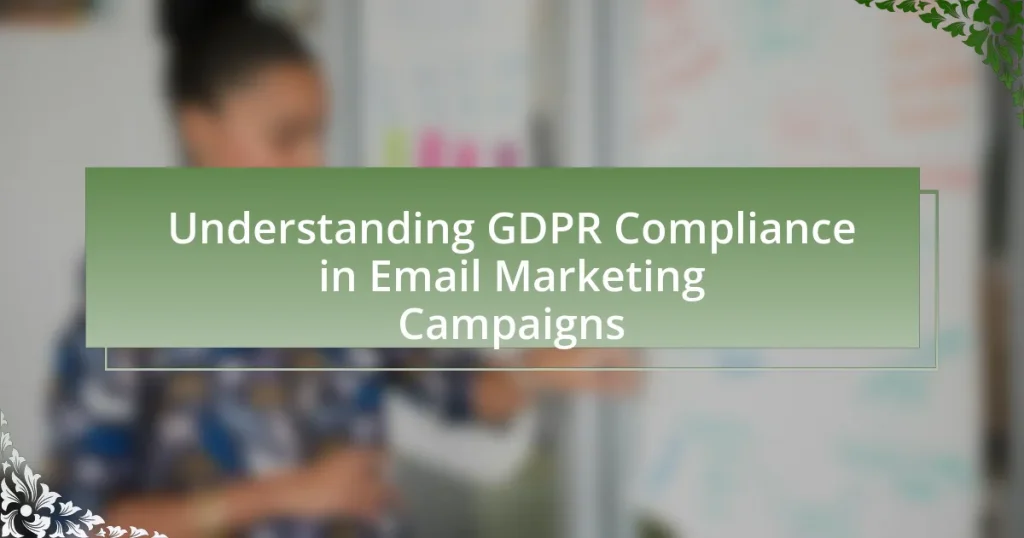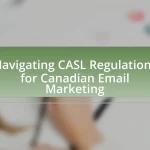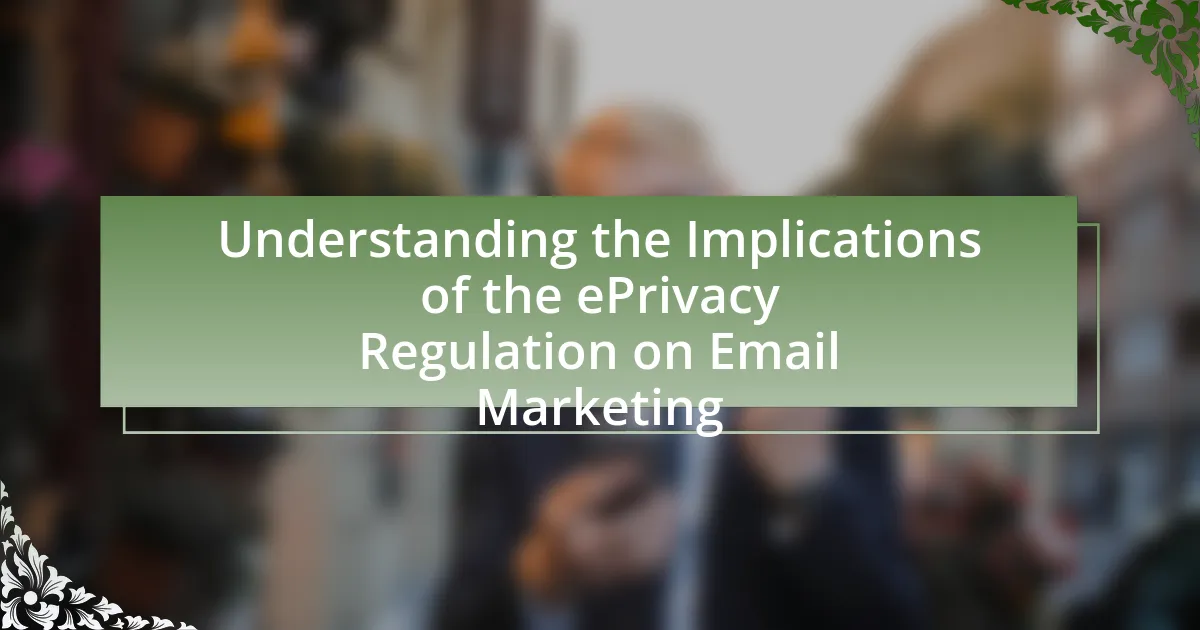GDPR compliance in email marketing campaigns is centered around the General Data Protection Regulation, which requires businesses to obtain explicit consent from individuals before collecting and processing their personal data. This regulation emphasizes key principles such as consent, data minimization, transparency, and the right to access, all aimed at enhancing consumer privacy. The article outlines the requirements for GDPR compliance, including the necessity for clear consent mechanisms, data protection measures, and maintaining accurate records. It also discusses the consequences of non-compliance, including significant fines and reputational damage, while providing practical tips for businesses to ensure adherence to GDPR standards in their email marketing strategies.
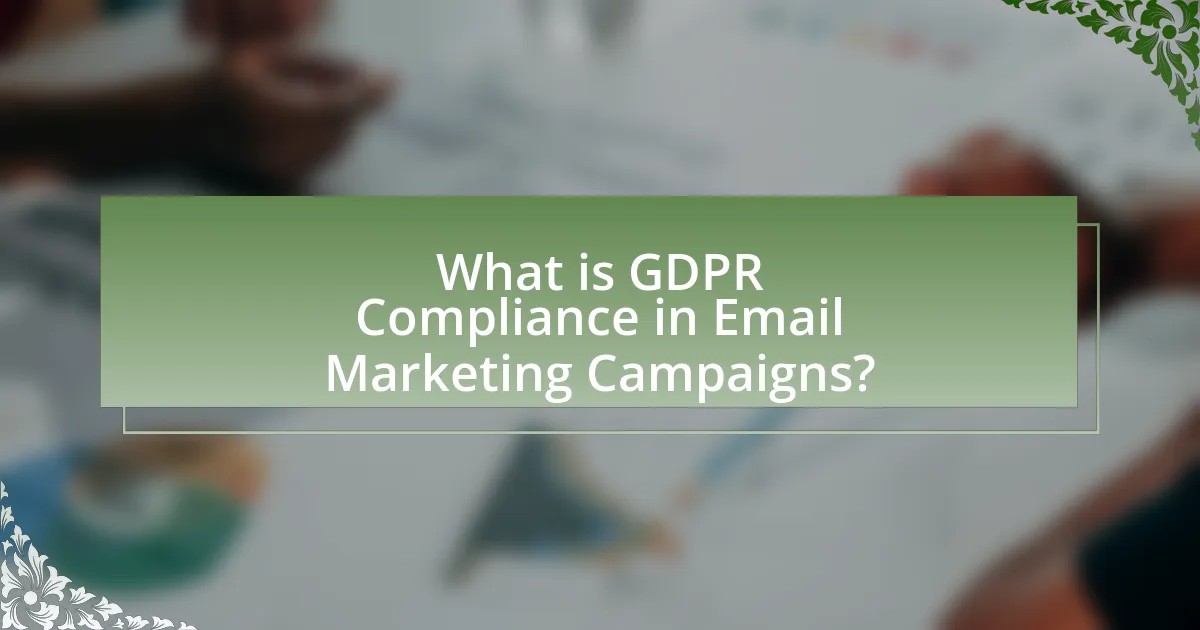
What is GDPR Compliance in Email Marketing Campaigns?
GDPR compliance in email marketing campaigns refers to adhering to the General Data Protection Regulation, which mandates that businesses obtain explicit consent from individuals before collecting and processing their personal data. This regulation, effective since May 25, 2018, requires marketers to provide clear information about how personal data will be used, ensure the right to access and delete data, and implement measures to protect data privacy. Non-compliance can result in significant fines, up to 4% of annual global turnover or €20 million, whichever is higher, emphasizing the importance of following these guidelines in email marketing practices.
Why is GDPR important for email marketing?
GDPR is important for email marketing because it establishes strict guidelines for obtaining consent from individuals before sending marketing communications. This regulation mandates that businesses must clearly inform recipients about how their data will be used and provide an easy way to withdraw consent. Non-compliance can result in significant fines, with penalties reaching up to 4% of a company’s annual global turnover or €20 million, whichever is higher. Therefore, adhering to GDPR not only protects consumer privacy but also safeguards businesses from legal repercussions.
What are the key principles of GDPR that affect email marketing?
The key principles of GDPR that affect email marketing include consent, data minimization, transparency, and the right to access. Consent requires that individuals give explicit permission for their data to be processed, which means marketers must obtain clear agreement before sending marketing emails. Data minimization mandates that only necessary information for the intended purpose should be collected, ensuring that marketers do not gather excessive personal data. Transparency involves informing individuals about how their data will be used, including the purpose of email communications and the identity of the data controller. Lastly, the right to access allows individuals to request information about the data held on them, including how it is used in email marketing campaigns. These principles are designed to protect personal data and ensure that individuals have control over their information.
How does GDPR impact consumer privacy in email marketing?
GDPR significantly enhances consumer privacy in email marketing by requiring explicit consent from individuals before their personal data can be processed. This regulation mandates that marketers must obtain clear, affirmative consent from consumers, ensuring that individuals are fully informed about how their data will be used. For instance, under GDPR, pre-checked boxes for consent are not permissible; consumers must actively opt-in to receive marketing communications. Additionally, GDPR grants consumers the right to access their data, request corrections, and demand deletion, which further empowers individuals regarding their personal information. These requirements are designed to protect consumer privacy and ensure that email marketing practices are transparent and respectful of individual rights.
What are the requirements for GDPR compliance in email marketing?
The requirements for GDPR compliance in email marketing include obtaining explicit consent from individuals before sending marketing emails, providing clear information about data processing, allowing individuals to easily withdraw consent, ensuring data protection measures are in place, and maintaining records of consent. Explicit consent means that individuals must actively agree to receive emails, which can be demonstrated through opt-in mechanisms. Clear information about data processing involves informing recipients about how their data will be used, who will have access to it, and their rights regarding their data. The ability to withdraw consent must be straightforward, allowing individuals to unsubscribe easily. Data protection measures must comply with GDPR standards, ensuring that personal data is securely stored and processed. Maintaining records of consent is essential for demonstrating compliance in case of audits or inquiries.
What constitutes valid consent under GDPR?
Valid consent under GDPR requires that individuals provide a clear, affirmative action indicating their agreement to the processing of their personal data. This means consent must be freely given, specific, informed, and unambiguous, as outlined in Article 7 of the GDPR. For consent to be valid, individuals must be aware of what they are consenting to, including the purpose of data processing and the identity of the data controller. Additionally, consent must be revocable, allowing individuals to withdraw their consent at any time, which reinforces their control over their personal data.
How should businesses manage personal data in compliance with GDPR?
Businesses should manage personal data in compliance with GDPR by implementing clear consent mechanisms, ensuring data minimization, and providing individuals with rights to access and delete their data. Clear consent mechanisms require businesses to obtain explicit permission from individuals before collecting or processing their personal data, as mandated by Article 7 of the GDPR. Data minimization involves collecting only the data necessary for specific purposes, aligning with the principle outlined in Article 5(1)(c). Additionally, businesses must facilitate individuals’ rights to access their data (Article 15) and the right to erasure (Article 17), ensuring that users can easily request and receive their information or have it deleted upon request. These practices not only align with GDPR requirements but also enhance trust and transparency with customers.
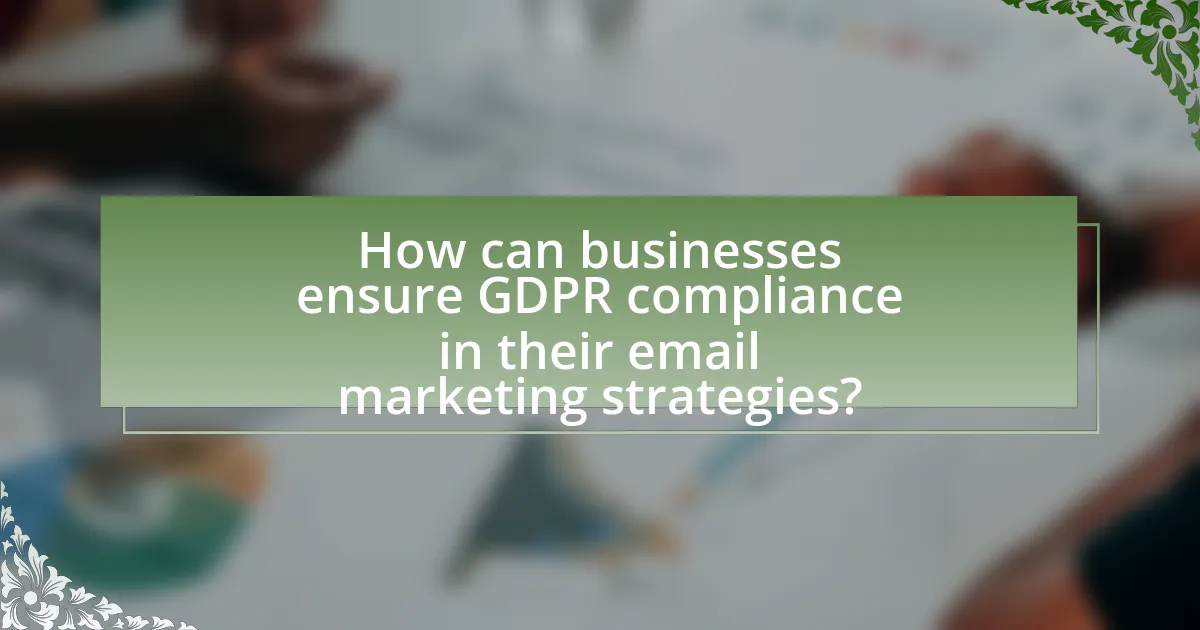
How can businesses ensure GDPR compliance in their email marketing strategies?
Businesses can ensure GDPR compliance in their email marketing strategies by obtaining explicit consent from individuals before sending marketing communications. This involves clearly informing recipients about how their data will be used, providing an easy way to opt-in, and ensuring that consent is freely given, specific, informed, and unambiguous, as outlined in Article 7 of the GDPR. Additionally, businesses must maintain accurate records of consent and allow recipients to withdraw their consent at any time, which aligns with the rights granted under GDPR. Failure to comply can result in significant fines, as seen in cases where organizations have been penalized for non-compliance, reinforcing the importance of adhering to these regulations.
What steps should be taken to obtain consent from subscribers?
To obtain consent from subscribers, organizations must implement a clear and transparent consent process. This involves providing subscribers with specific information about what they are consenting to, including the purpose of data collection, how their data will be used, and their rights regarding their data.
Organizations should use opt-in mechanisms, ensuring that consent is given freely, specifically, and unambiguously. This means that pre-ticked boxes or inactivity should not be considered valid consent. Additionally, organizations must keep a record of consent, including the date and method of consent, to demonstrate compliance with GDPR requirements.
According to the GDPR, consent must be as easy to withdraw as it is to give, so organizations should provide straightforward methods for subscribers to revoke their consent at any time. This structured approach ensures that consent is valid and aligns with legal obligations under GDPR.
How can businesses create effective consent forms?
Businesses can create effective consent forms by ensuring clarity, specificity, and compliance with GDPR requirements. Clear language helps users understand what they are consenting to, while specific details about data usage, retention, and third-party sharing enhance transparency. Compliance with GDPR mandates that consent must be freely given, informed, specific, and unambiguous, which means businesses should avoid pre-ticked boxes and ensure that consent is obtained through affirmative action. Additionally, providing users with easy access to withdraw consent at any time is crucial, as it aligns with GDPR’s emphasis on user control over personal data.
What role does transparency play in obtaining consent?
Transparency is essential in obtaining consent as it ensures that individuals are fully informed about how their personal data will be used. When organizations clearly communicate the purpose, scope, and implications of data collection, individuals can make informed decisions regarding their consent. According to the General Data Protection Regulation (GDPR), transparency is a fundamental principle that mandates organizations to provide clear and accessible information about data processing activities, thereby fostering trust and enabling individuals to exercise their rights effectively.
How can businesses manage subscriber data in accordance with GDPR?
Businesses can manage subscriber data in accordance with GDPR by implementing clear consent mechanisms, ensuring data accuracy, and providing easy access for data subjects to exercise their rights. Clear consent mechanisms require businesses to obtain explicit permission from subscribers before collecting or processing their personal data, which aligns with Article 7 of the GDPR that mandates informed consent. Ensuring data accuracy involves regularly updating subscriber information and allowing subscribers to correct their data, as stipulated in Article 5(1)(d) of the GDPR. Additionally, businesses must provide subscribers with the ability to access their data, request deletion, or withdraw consent, in compliance with Articles 15 and 17 of the GDPR. These practices not only fulfill legal obligations but also enhance trust and transparency with subscribers.
What are the best practices for data storage and security?
The best practices for data storage and security include implementing encryption, regular backups, access controls, and compliance with regulations such as GDPR. Encryption protects data at rest and in transit, ensuring that unauthorized users cannot access sensitive information. Regular backups safeguard against data loss due to hardware failures or cyberattacks, allowing for quick recovery. Access controls limit data access to authorized personnel only, reducing the risk of internal breaches. Compliance with GDPR mandates that organizations handle personal data responsibly, including obtaining consent and ensuring data subject rights are respected. These practices collectively enhance data security and protect against breaches, aligning with legal requirements and industry standards.
How can businesses ensure data accuracy and update subscriber information?
Businesses can ensure data accuracy and update subscriber information by implementing regular data audits and utilizing automated systems for data collection and updates. Regular audits help identify discrepancies and outdated information, while automated systems can streamline the process of collecting and updating subscriber data in real-time. According to a study by Experian, 95% of organizations believe that data quality is critical to their success, highlighting the importance of maintaining accurate subscriber information. Additionally, businesses should provide subscribers with easy access to update their information, which aligns with GDPR requirements for transparency and user control over personal data.
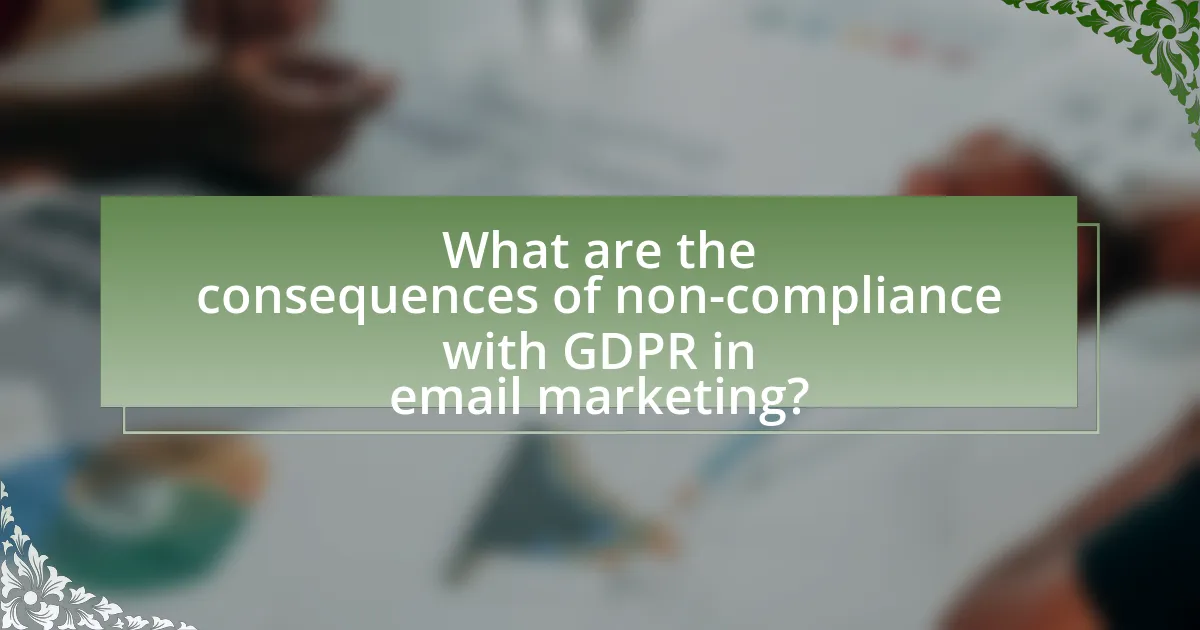
What are the consequences of non-compliance with GDPR in email marketing?
Non-compliance with GDPR in email marketing can lead to significant financial penalties, legal actions, and reputational damage. Organizations that fail to adhere to GDPR regulations may face fines of up to €20 million or 4% of their annual global turnover, whichever is higher, as stipulated in Article 83 of the GDPR. Additionally, non-compliance can result in lawsuits from affected individuals, leading to further financial liabilities and potential compensation claims. Furthermore, businesses may suffer reputational harm, which can diminish customer trust and loyalty, ultimately impacting their market position and profitability.
What penalties can businesses face for GDPR violations?
Businesses can face significant penalties for GDPR violations, including fines of up to €20 million or 4% of their annual global turnover, whichever is higher. The General Data Protection Regulation (GDPR) establishes these penalties to enforce compliance and protect personal data. For instance, in 2021, a major retailer was fined €1.2 million for failing to secure customer data, demonstrating the regulation’s strict enforcement. Additionally, businesses may also face reputational damage and legal costs associated with non-compliance, further emphasizing the importance of adhering to GDPR requirements.
How can non-compliance affect a business’s reputation?
Non-compliance with regulations like GDPR can severely damage a business’s reputation. When a company fails to adhere to data protection laws, it risks public backlash, loss of customer trust, and negative media coverage. For instance, a study by the Ponemon Institute found that 75% of consumers would stop purchasing from a company that experienced a data breach due to non-compliance. Additionally, regulatory fines and legal actions can further tarnish a brand’s image, leading to long-term financial repercussions and diminished market position.
What are common pitfalls to avoid in GDPR compliance for email marketing?
Common pitfalls to avoid in GDPR compliance for email marketing include failing to obtain explicit consent, neglecting to provide clear opt-out options, and not maintaining accurate records of consent. Obtaining explicit consent is crucial, as GDPR mandates that individuals must actively agree to receive marketing communications. Neglecting to provide clear opt-out options can lead to non-compliance, as recipients must have an easy way to withdraw their consent at any time. Additionally, not maintaining accurate records of consent can result in difficulties in demonstrating compliance during audits or investigations, which is essential for avoiding potential fines and penalties.
What mistakes do businesses often make regarding consent?
Businesses often make the mistake of not obtaining explicit consent from individuals before sending marketing communications. Under GDPR, consent must be clear, informed, and freely given, yet many companies use pre-checked boxes or vague language that does not meet these criteria. For instance, a survey by the International Association of Privacy Professionals found that 60% of businesses do not adequately inform users about how their data will be used, leading to non-compliance with GDPR regulations. Additionally, businesses frequently fail to provide an easy way for individuals to withdraw consent, which is a requirement under GDPR, further complicating their compliance efforts.
How can businesses mismanage data and face compliance issues?
Businesses can mismanage data and face compliance issues by failing to adhere to GDPR regulations, which require explicit consent for data collection and processing. Non-compliance can occur through inadequate data protection measures, such as not encrypting sensitive information or not implementing proper access controls, leading to data breaches. According to the European Data Protection Board, organizations that do not comply with GDPR can face fines of up to 4% of their annual global turnover or €20 million, whichever is higher. Additionally, businesses may mishandle data by not providing individuals with the right to access, rectify, or delete their personal information, further exacerbating compliance risks.
What practical tips can help businesses achieve GDPR compliance in email marketing?
To achieve GDPR compliance in email marketing, businesses should implement explicit consent mechanisms for collecting personal data. This means obtaining clear, affirmative consent from individuals before sending marketing emails, ensuring that the consent process is transparent and easy to understand. Additionally, businesses must provide an easy way for recipients to withdraw their consent at any time, which aligns with GDPR’s requirements for data subject rights.
Furthermore, organizations should maintain detailed records of consent, including when and how consent was obtained, to demonstrate compliance if required. Regularly reviewing and updating privacy policies to reflect current practices and ensuring that all marketing communications include necessary information about data processing are also essential steps. According to the Information Commissioner’s Office (ICO), failure to comply with these requirements can result in significant fines, reinforcing the importance of adhering to GDPR standards in email marketing.
How can businesses regularly audit their email marketing practices for compliance?
Businesses can regularly audit their email marketing practices for compliance by implementing a structured review process that includes checking consent records, reviewing email content for compliance with GDPR regulations, and ensuring proper data handling procedures are in place. This process should involve verifying that all recipients have opted in to receive communications, assessing whether the content aligns with the stated purpose of data collection, and confirming that data is stored securely and used appropriately. Regular audits can be supported by utilizing compliance checklists and tools designed to track consent and data usage, ensuring adherence to GDPR requirements, which mandate that businesses maintain transparency and accountability in their email marketing efforts.
What resources are available to assist with GDPR compliance in email marketing?
Resources available to assist with GDPR compliance in email marketing include official guidelines from the European Commission, legal advice from GDPR compliance consultants, and tools like consent management platforms. The European Commission provides comprehensive documentation outlining GDPR requirements, which is essential for understanding obligations. GDPR compliance consultants offer tailored advice and strategies to ensure adherence to regulations. Consent management platforms, such as OneTrust and TrustArc, help businesses manage user consent effectively, ensuring that email marketing practices align with GDPR standards. These resources collectively support organizations in navigating the complexities of GDPR compliance in their email marketing efforts.
